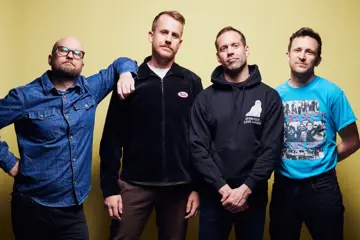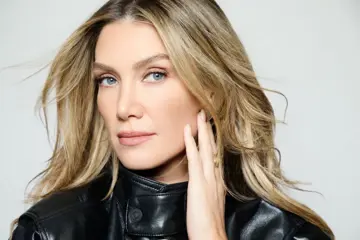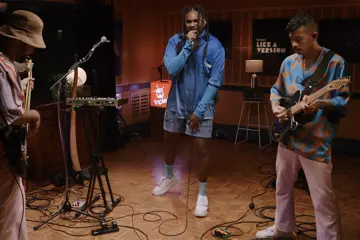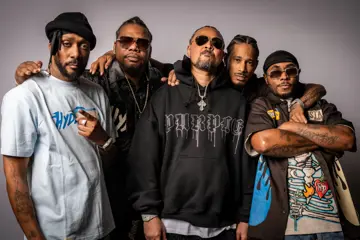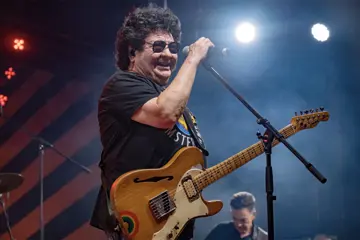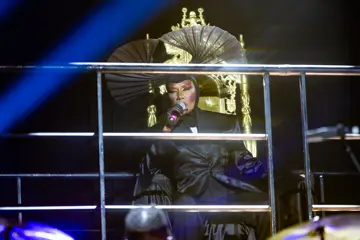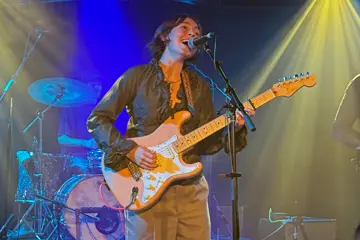When World's End Press were scouting for producers for their debut album, the DFA's Tim Goldsworthy was on the top of their list. Sonically, the co-founder of the Mo-Wax and DFA labels seemed like the perfect fit. "It was just a case of sending stuff out and hoping for the best," says vocalist John Parkinson, sitting with drummer Tom Ghould in the swanky boardroom of Liberation Records. "There were a number of producers that we tried that with, but Goldsworthy was the cream of the crop."
There was much to be intimidated by in Goldsworthy's musical history. This is a man who has produced UNKLE, David Holmes and Massive Attack, and has run two successful labels. "But he showed his interest and also really liked what was going on, which definitely helped," says Ghould. The flipside was that relinquishing control was easy, says Parkinson. "Tim was quite convinced of certain things and I was like, 'Well I'm going to trust you, because you're Tim Goldsworthy. I used to listen to your records when I was 15'."
Parkinson agrees there's a 'Britishness' to the World's End Press sound. "I think that just comes down to the music that I was listening to when I was young," he says. "It was for the most part British, and actually most of the stuff was from Bristol: Massive Attack, Portishead, Moloko. All that stuff that had [an] insular, melancholic pop thing. And that's not really Australian I suppose."
With Goldsworthy on board to produce the record, the four Melbourne lads found themselves in the Welsh countryside at Rockfield Studio, a place that has more than its fair share of esteemed musical history. Dharann played a piano Freddy Mercury played there, Stevie Wonder recorded there and so did The Stone Roses. "There's this little vomit stain in one of the rooms which is Ian Brown's vomit stain," says Parkinson. They could have cut it out with a Stanley knife and sold it on eBay to fund the next record, but, according to Parkinson, the band behaved "like boy scouts" for the duration of the recording.
Don't miss a beat with our FREE daily newsletter
"We didn't [really] do anything but record because it was so removed from anything," says Ghould. "We got to a point of throwing rocks in a bucket. That was one of those moments; you're standing around with Tim Goldsworthy, chatting and throwing rocks in a bucket – it was surreal." No World's End Press vomit stains then? "No. We might have spilt some Horlicks," laughs Parkinson.
In terms of direction, the band agreed with Goldsworthy that live and organic was the way to go. "He worked us pretty hard," Ghould recalls of the producer's approach. "I expected to play a few bars of drums and then go and have a beer, and he was like, 'No, you're playing the whole thing'." Parkinson contributes: "He told us to just play. I guess we're lucky because we've had so much time to play shows that that obviously really helped. The very first day we actually played the whole album in full, all the way through, over and over and over again.
"It's crazy now – in the laptop, computer music generation – that you have to think, 'I can actually play this song all the way through with an instrument'. People in bands in the '60s and '70s, even '80s to an extent, just played songs. Now you create an artifice that is the song and then you learn how to play it. It's the reverse way of doing things. But going through that process with Tim set us up for the future of this band, which is making things as organically as possible but still sounding electronic."
The record is infused with the spirit of Can, whose The Lost Tapes the band listened to [continually], absorbing what Parkinson describes as "that really motoric tech stuff". Non-musically, Goldsworthy exposed the band to his extensive rare, vintage video collection. "He was showing us all these weird VHS-y things and there were just loads of nice textures to get us in the mood."
The Welsh environment also ended up being an influence. "We were looking at a lot of rain and green and grey skies and mist," Parkinson explains, "so you can't help but play a certain way because of that. I think the album sounds wintery, but generally I think the way we play these songs live is summery. We're a winter-recorded band but a summer live band."



